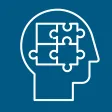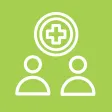We’re glad you’re here! Please take a few moments to tell us who you are, so we can continue to evolve this work in relevant ways.
Twenty-percent of American adults experience a mental health condition every year, and 1 in 25 Americans lives with a serious mental illness. From previous research and experience, we know that changing the way people talk about mental health can reduce negative stigma and stereotypes.
When considering who can have a significant communicative impact on the way our society talks and thinks about mental health and serious mental illness, two groups of professionals have the power to reach and influence large audiences: journalists and frontline healthcare providers (physicians, nurses, pharmacists, specialists, technicians, etc.). Training these professionals — especially when they are students — to more accurately, sensitively, and effectively communicate about this important topic can start a ripple effect of positive change throughout society.
Therefore, with the support of the Hogg Foundation for Mental Health, we have created resources that address one overarching, important question; What are the best ways to train healthcare professionals and journalists about mental health and mental illness communication... and why should we care?
Whitepaper: Mental Health Communication:
What We Know and What We Can Do Better
Focusing on traditional journalists and healthcare providers, we’ve reviewed existing academic research around mental health-related communication, including sub-topics like stigma, provider challenges, and journalistic framing. This whitepaper is an overarching summary of what we know about effective mental health communication, culminating in four evidence-based recommendations on how we can improve. Our goal is to provide pragmatic, approachable solutions, so we can begin to change the way everyone thinks and talks about mental health.
Interested in this project but don’t have time right now to absorb the whole thing? Check out our front-and-back summaries for journalists and medical professionals
Download 1-pager for Journalists Download 1-pager for Medical Professionals
Curriculum modules

Mental Health Conditions 101
This module introduces basic statistics about prevalence of mental health conditions, de-bunks common myths about people with mental health diagnoses, and helps students understand how they can reduce negative stigma.
DOWNLOADS
Slides- CHC Mental Health Facts 101
Instructor Guide

Understanding, Recognizing and Addressing Implicit Bias
This lesson will help students face their subconscious beliefs and fears about mental health conditions, and show them how to start evolving their thinking around stereotypes and biases.
DOWNLOADS
Slides- Understanding, Recognizing and Addressing Implicit Bias
Instructor Guide
Friedman (2014)

Structural Competency
It’s important to understand how political powers, national policies, local laws and policies, institutional racism, economics, and other social structures can create or exacerbate mental health challenges, and well as prevent folks from seeking and receiving treatment.
DOWNLOADS
Slides- Structural Competency
Instructor Guide
Social Determinants of Mental Health
Pickett & Wilkinson (2010) Inequality as source of mental illness

Non-Verbal Communication in Patient-Provider Interactions
This module helps medical students understand the basics of non-verbal communication, and introduces small, non-verbal tactics that encourage open communication from patients about mental health challenges.
DOWNLOADS
Slides- Non-Verbal Communication in Patient-Provider Interactions
Instructor Guide
MedProGroup – Patient-Provider Communication Guide
Standalone Activities
Don’t have time for a full lesson? We have standalone activities to help individuals or groups engage with topics related to mental health communication.

Problematic Patient Chart
Participants review a fake patient’s medical chart, which contains stigmatizing and subjective language about the “patient’s” mental health status. They are asked to replace problematic words and phrases with more sensitive, accurate, and person-centered verbiage. This activity includes an instructor guide, a fake patient chart, an “improved” patient chart, and de-briefing discussion questions.
DOWNLOADS
Activity Guide

Observation Activity
Participants are asked to pay close attention to media, personal conversations, and the general world around them for 24 hours, to observe how (and how often) mental health is discussed in a typical day. The goal is to draw attention to how society talks about mental health and mental illness, and encourage participants to think critically the messages they encounter in their daily lives. This activity includes an instructor guide, worksheet to record observations, and de-briefing discussion questions.
DOWNLOADS
Activity Guide
